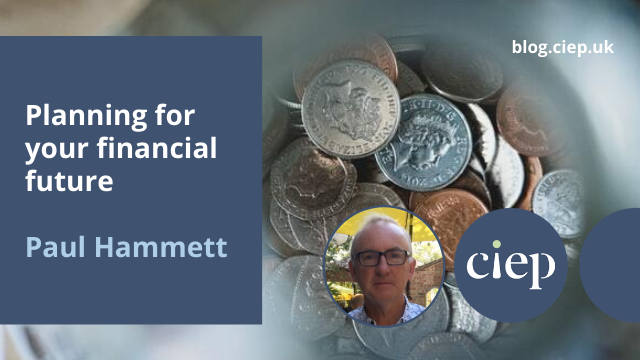Self-employment brings with it many benefits, but not often financial predictability. Some months, it’s all about bringing enough income in to pay the bills. Paul Hammett looks at where to start if you’re looking towards your financial future.
I’ve been a financial advisor for 30 years, and have talked to a lot of clients about how they can plan for the future and make the most of their money. This article lists the top ten areas to consider.
1. Do you need life insurance?
The vast majority of people with children should consider life insurance cover. When did you last look at your life insurance arrangements? Is your life insurance up to date, appropriate, and held in trust? If you or your partner has company benefits, make sure you complete a nomination form to ensure the money passes to who you want it to.
2. Do you need income protection?
This is an area that many people overlook. Have you considered protecting your income in case you are unable to work? Income protection plans can be expensive, but what would happen if you were unable to work for a time due to an accident or illness? How would you pay your mortgage and bills?
3. Get a forecast of your state pension
If you’re in the UK, visit gov.uk/browse/working/state-pension to obtain accurate, up-to-date information about your state pension: this website will tell you how much you will receive and when it will be paid. In future, you will actually have to apply for a state pension instead of your pension automatically starting when you reach retirement age. This will give you an idea of how much you will have to live on in retirement, and you can start to consider personal pensions to top up your state pension. If you’re based elsewhere, check your state pension provider for similar.
4. Check your previous pensions
If you have paid into any pensions, when did you last review their value? You may have a pot of money: is it in the right fund for the level of risk you’re happy with? How has your fund performed? Have you completed a beneficiary nomination form so that, if you die, the money will go to your partner or children? This is a complex area so it’s often best to seek expert advice from a financial advisor who specialises in pensions.
5. Make a will
Have you made a will? If so, when did you last review it? Is it still relevant? Are the executors still the people you would choose, or are they old friends who have since moved away and you’re no longer in contact? This is important: the people you choose will have to administer your will and carry out your wishes, so you must be able to trust them.
 6. Safe as houses: is your mortgage the best one for you?
6. Safe as houses: is your mortgage the best one for you?
A house is the biggest purchase most of us will ever make, yet many people stay with the same mortgage provider for years and don’t review their mortgage. Many of these are interest-only mortgages with no form of repayment vehicle. Make sure this is not you! Mortgage companies in the UK are now writing to homeowners to check that they have a repayment vehicle in place. An ISA is the most common repayment vehicle today, but you may have an endowment if you took out your mortgage some time ago. If you want to restructure your mortgage, most lenders will insist it is done on a repayment basis (so your mortgage is repaid by the end of the mortgage term). Ask your mortgage lender for advice, or see a mortgage advisor.
7. If you can, overpay your mortgage
If you’re happy with your current mortgage deal, I strongly recommend that you take advantage of the current low interest rates and think about making monthly overpayments, however small. You will be amazed at the difference this makes to reduce the term of your mortgage. If you can afford to overpay now and get used to paying the higher rate each month, when interest rates start to go up, as they probably will, this gives you a buffer against your monthly mortgage increase. For example, imagine your mortgage is £500 per month but interest rates go up and you have to pay £600 per month. If you’re already overpaying your mortgage and paying £600 per month, you won’t notice this increase.
8. Review your income and expenditure
Once a year, make a coffee – or a pour a glass of wine – then sit down with whoever shares your financial decisions and list all your income and outgoings, to find out where all your money goes and to see whether you can make any savings anywhere. Be honest with yourself: if money is tight, is paying for Sky Sports or having a takeaway latte every day more important than paying for life insurance to protect your children should the worst happen? I advise clients to do this exercise separately then come together to compare their lists – they may look quite different!
9. Carry out an annual business review
When you’ve finished talking about your personal income and outgoings, do the same for your business. Do you know all your running costs? Without doing this, how can you quote for any work or know what you need to charge to cover your costs?
There’s more advice on this in Going Solo: Creating your freelance editorial business by Sue Littleford.
10. Shop around to get a better deal
Rather than clicking on ‘renew’ when an insurance renewal notice drops into your inbox, why not look at price comparison websites to see if you can get a better deal? Try moneysupermarket.com, comparethemarket.com or confused.com. A lot of companies give introductory discounts, so changing insurer means that you save money. The same goes for gas and electricity: check out moneysavingexpert.com/utilities/you-switch-gas-electricity/.
Putting the pieces together
Financial planning is like a jigsaw. You may not have all the pieces, but the more you can collect and put in place, the prettier the picture you will make – and the better your financial future will look.
Don’t be put off if you can’t take action on all of these suggestions. Prioritise the list for your circumstances, then review it every year to see if anything has changed.
About Paul Hammett
Paul Hammett specialises in giving advice on investment and pensions, providing an all-round financial planning service to help clients meet their financial goals. He enjoys advising clients and their families over the long term, and has worked with many clients for over 20 years.
 About the CIEP
About the CIEP
The Chartered Institute of Editing and Proofreading (CIEP) is a non-profit body promoting excellence in English language editing. We set and demonstrate editorial standards, and we are a community, training hub and support network for editorial professionals – the people who work to make text accurate, clear and fit for purpose.
Find out more about:
Photo credits: coins by Nick Fewings; house by Tierra Mallorca, both on Unsplash.
Posted by Abi Saffrey, CIEP blog coordinator.
The views expressed here do not necessarily reflect those of the CIEP.

